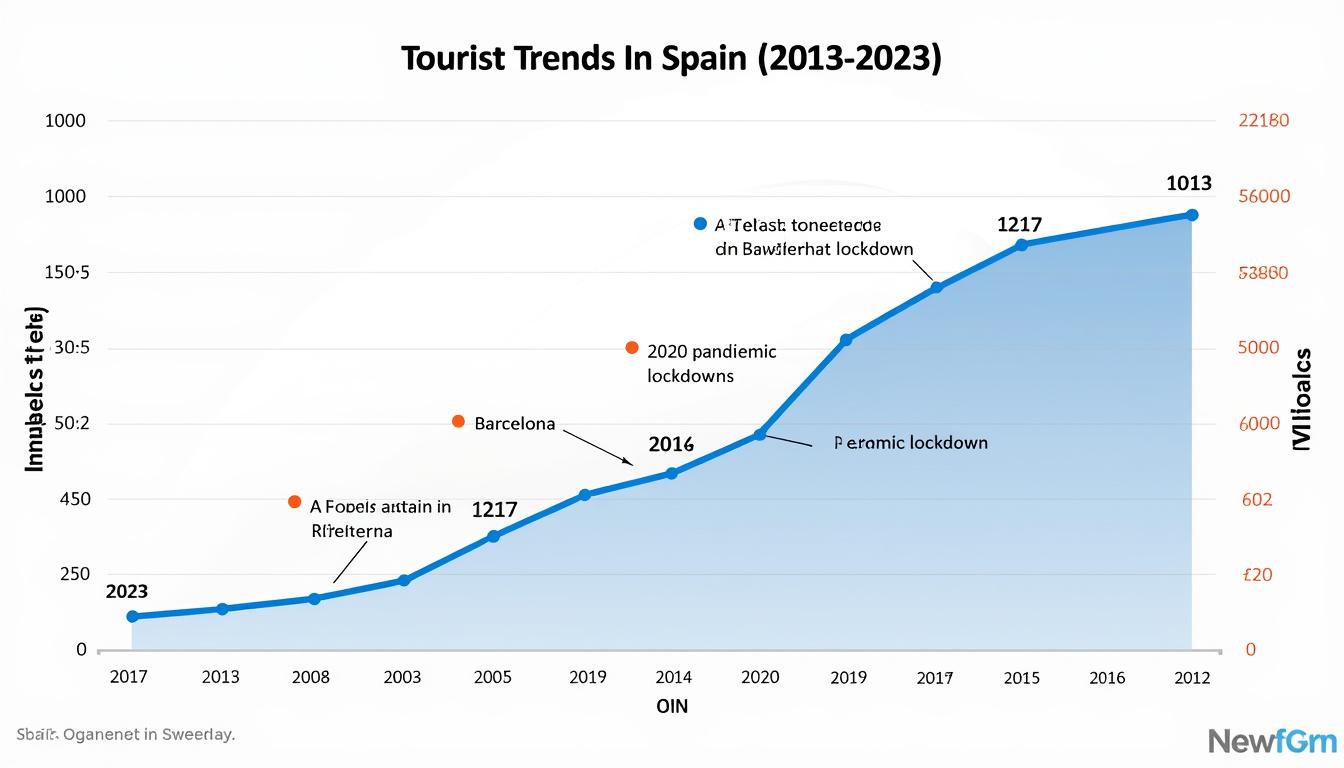The recent decision by Booking.com to remove over 4,000 listings in Spain represents a significant shift within the short-term rental market, emphasizing governmental authority to regulate the industry more strictly. This move, influenced by Spain’s consumer ministry, highlights ongoing concerns over housing shortages and the impact of unregulated tourist accommodations on local communities. As tourism surges, balancing economic interests with local needs becomes increasingly vital.
Background of Spain’s Rental Market and Regulation
Spain’s rental market has thrived in recent years due to a booming tourism industry, which has brought millions of visitors to its shores. However, the rapid expansion of platforms such as Airbnb, Expedia, and Booking.com has led to a sharp increase in short-term rentals, particularly in tourist-heavy regions like Barcelona and the Canary Islands. The surge of vacation rentals has raised alarms regarding housing availability for locals, often leading to inflated rental prices and a depletion of affordable housing options.
In response, the Spanish government has initiated stricter regulations aimed at controlling the rise of unlicensed tourist accommodations. These regulations require rental properties to meet certain standards and obtain official licenses, thus ensuring they contribute to local economies without displacing residents. The removal of listings by Booking.com aligns with these efforts and represents a broader crackdown on illegal rentals, especially as tourist destinations seek to promote sustainable tourism practices.
The Canary Islands alone are a prime example of an area heavily reliant on tourism yet facing housing challenges. The local government has expressed frustration over unauthorized listings that detract from their initiatives to enhance housing availability for citizens. By enforcing regulations, authorities aim to balance the economic benefits of tourism with the necessity of preserving community integrity. This delicate balance is crucial as Spain seeks to maintain its reputation as a premier travel destination.
The Regulatory Landscape
The evolving regulatory landscape is essential to understand the motivations behind Booking.com’s recent actions. The new policies not only involve stricter checks on licensed accommodations but also introduce penalties for platforms that fail to comply. This represents a paradigm shift in how online travel agencies operate within Spain.
- Increased scrutiny on listings: The government is actively monitoring rental properties to ensure compliance with local laws.
- Penalties for non-compliance: Platforms face significant fines if they fail to remove unauthorized listings.
- Potential for increased revenues: Regulated rentals may contribute more to local economies through taxes and better governance.
To further illustrate, a comparative analysis shows how similar regulatory measures in other countries, such as New York and San Francisco, have faced challenges and opportunities. These cities have implemented regulations that require licenses for short-term rentals, setting a precedent that Spain is currently following.
| City | Regulation Type | Key Outcomes |
|---|---|---|
| New York | Short-term rental registration | Increased compliance and reduced illegal listings |
| Barcelona | Tourist license mandatory | Stricter fines and reduced number of illegal rentals |
| San Francisco | Short-term rental cap | Enhanced housing availability and community support |
Through these regulations, the Spanish government is hoping to protect its citizens and ensure that tourism benefits the local populace, rather than contributing to its displacement. This critical juncture for Spain’s rental market signifies not only the enforcement of regulations but also a commitment to maintaining sustainable practices that respect both tourists and locals alike.

Impact on Rental Owners and Platforms
The removal of thousands of listings from Booking.com has sent shockwaves through the rental community, affecting property owners, investors, and platforms alike. This decision poses challenges for individual property owners who rely on rental income, particularly in an already competitive market impacted by the pandemic and changing travel habits. Many owners may now face uncertainty regarding their financial sustainability, as a reduction in available properties can lead to increased competition and pricing pressures.
Online travel agencies are also navigating a complex landscape as they reconcile the need for compliance with customer demand for diverse accommodation options. Platforms like Airbnb, Hotels.com, and VRBO are likely to monitor the situation closely, potentially facing similar pressures from regulatory bodies in other regions as well. To adapt, these companies may need to invest in better compliance mechanisms and further enhance their relationships with local authorities.
Adjustments for Property Owners
In light of these developments, property owners are advised to take proactive measures to ensure their compliance with local regulations. Some strategies include:
- Regularly check local laws: Stay updated with changes in regulations that might affect rental status.
- Obtain necessary licenses: Ensuring that all required documents are in place not only helps avoid penalties but reinforces legitimacy.
- Engage local communities: Building rapport with local residents can foster goodwill and support amidst regulatory changes.
By understanding the importance of compliance and community engagement, property owners can better navigate these turbulent waters. The need for adaptability and resilience in the face of such policies is paramount, as the landscape of the rental market continues to evolve in response to both governmental influences and consumer preferences.
| Challenge | Potential Solution | Expected Outcome |
|---|---|---|
| Loss of listings | Diversify marketing efforts | Increased visibility on remaining platforms |
| Regulatory compliance | Consult a legal advisor | Reduced risk of penalties |
| Community backlash | Practice transparency in operations | Improved community relations |
Future of Short-Term Rentals in Spain
The future of short-term rentals in Spain rests heavily on the ability of the government, property owners, and platforms to adapt to the ongoing regulatory changes effectively. As the tourism sector continues to recover and expand, strategies must evolve to meet both visitor expectations and local demands for housing. This balance will be key to ensuring that Spain remains a leading destination without sacrificing the needs of its residents.
Potential collaborations between local governments and rental platforms to create an equitable framework for short-term rentals may emerge. Such partnerships might include:
- Joint marketing initiatives: Highlighting licensed properties that contribute positively to local economies.
- Shared data resources: Providing insights into rental trends to better inform policy decisions.
- Community-led tourism programs: Engaging locals in developing tourism strategies that benefit everyone.
By nurturing an environment of cooperation, stakeholders in Spain’s tourism sector can pave the way for a more sustainable future. This cooperative approach can instill confidence in travelers that their tourism dollars directly contribute to the local economy while preserving the unique charm of their chosen destination.
The Role of Major Platforms
Major booking platforms like Tripadvisor and Trivago, have a crucial role to play in adapting to these emerging regulations. As they grapple with their responsibilities in the rental space, they can ensure consumer trust and regulatory compliance through comprehensive verification processes and improved communication strategies. Failure to comply with local laws is no longer an option as scrutiny intensifies, and stakeholders must be prepared to innovate.
| Platform | Current Strategy | Needed Adjustments |
|---|---|---|
| Booking.com | Compliance-focused removal of listings | Create partnerships with local governments |
| Airbnb | Encouraging host compliance education | Implement stricter vetting processes |
| VRBO | Promoting long-term rental options | Expand marketing efforts for compliant rentals |

Consumer Preferences and the Marketing Strategy Shift
The fluctuations in consumer preferences concerning travel and accommodation options are intricately tied to how platforms engage with regulatory changes. The growing awareness of how tourism impacts local environments has led consumers to become more selective in where they choose to stay. In 2025, more travelers consider sustainability and community impact, seeking accommodations that align with their values.
As a result, marketing strategies for lodging providers must evolve to emphasize ethical and responsible tourism. This includes promoting properties that are licensed and comply with local regulations. The synergy between community well-being and tourism appeal should be at the forefront of any marketing campaign.
Adapting Marketing Strategies
To effectively reach consumers, property owners and online platforms must employ innovative marketing strategies that communicate compliance and sustainability effectively.
- Storytelling: Sharing narratives about how rentals positively impact local communities.
- Sustainability initiatives: Highlighting efforts to reduce environmental footprints.
- Transparency: Being open about compliance with regulations to build trust with consumers.
By adopting these strategies, bookings can reflect a commitment to not only meeting guest expectations but also fostering a deeper connection with local cultures. The future will showcase an evolution in how tourism and accommodation converge towards a more holistic approach that prioritizes both guest experiences and local communities.
